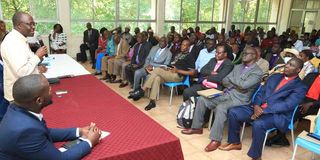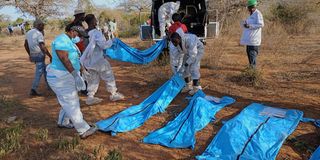
Task force on regulation of religious groups chairperson Mutava Musyimi speaks during a meeting in Kisumu on June 20, 2023. The team's recommendations are yet to be implemented.
A report by a task force established by President William Ruto on regulating religious institutions continues to gather dust despite a re-emergence of groups with controversial teachings.
The task force on the review of the legal and regulatory framework governing religious organisations chaired by Rev Mutava Musyimi made a number of recommendations to protect Kenyans from religious extremism.
However, the recommendations of the task force, established in the wake of the Shakahola killings have never been implemented.
Mr Musyimi on Monday told the Nation that “our greatest fear is that if this is not implemented, we are likely to see another Shakahola”.

The exhumation exercise in Shakahola forest on June 5, 2024.
“We did our part, it would be sad to witness another Shakahola having done that report with specific recommendations to the government,” said Rev Musyimi. “It would be a dereliction of duty.”
The Shakahola forest killings came to light in early 2023. By the end of last year, over 400 bodies had been exhumed from the shallow graves.
As the government continues to sit on the Musyimi-led task force’s report, two members of the Malkio St Joseph Mission of Messiah in Africa Church died inside the church premises last week after refusing to seek medical attention.

The family of a GSU officer who died and was buried in a church compound seek help from the Office of the Deputy County Commissioner in Rongo, Migori County, on April 11, 2025.
Some 57 other faithful were rescued from the church following a police raid.
Rev Musyimi, the former Secretary-General of the National Council for Churches of Kenya, revealed that the task force’s recommendations will serve the government well if they are implemented.
“We knew that this problem would come up again. That’s why this report is critical to the country,” he said.
The task force was established on May 23, 2023 through a Gazette notice by President Ruto. On July 30, 2024, the team handed in its report to the President at State House.
Among the team’s recommendations was the formulation of a policy framework and guidelines on self-regulation and government oversight to ensure transparency and responsible practices by religious organisations.
The report noted that Kenya has a history of religious extremism that has resulted in the loss of lives, and that the existing legal framework does not adequately address the problem.
“There is a need to undertake policy, legal, institutional and administrative reforms to ensure that the exercise of the freedoms of religion and association is not used in a manner that is detrimental to individual health and safety, the public interest and national values,” the task force noted.

A shrine at Melkio St Joseph Missions of Messiah in Africa Church at Opapo Villlage in Rongo, Migori County on April 22, 2025.
The team established that there was no existing policy framework for the religious sector and that rogue individuals and institutions had been having a field day taking innocent Kenyans, including children, and turning them into mental slaves.
Part of the solution was to have a distinct statute that clearly assigns a legal personality to religious organisations, lays down registration requirements and provides for offences “committed under the pretext of religion”.
Societies Act
“The existing regulatory framework, primarily governed by the Societies Act, is inadequate and does not address the unique character of the religious sector,” states the report.
The task force also recommended that all religious institutions, including churches, sects and denominations be registered afresh under a strict vetting regime.
The draft Religious Organisations Bill, 2024, which remains unpublished, seeks to regulate the practice of religion in the country.
According to the Bill, the registration and updating of particulars by religious institutions will be handled by the proposed Religious Affairs Commission, with a mandate to consider and verify the authenticity of every application in collaboration with relevant government agencies.
“A religious institution which was registered or exempted from registration under the Societies Act or any other written law and existing immediately before the commencement of this Act shall update particulars under this Act within one year after the commencement of this Act,” the draft Bill reads.
To implement this, the draft Bill states that religious institutions that do not register within a year will be deemed “unlawful religious institutions by the operation of the law”.
“An existing religious institution that does not apply for registration within the one year shall equally not be recognised,” it states.








